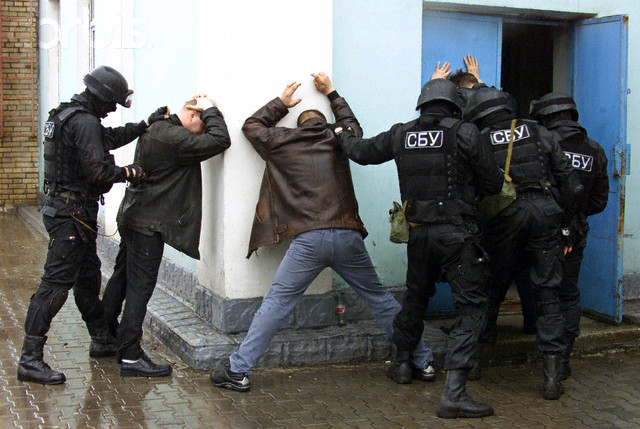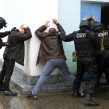
Ukraine’s Security Forces: Bloated, Incompetent and Still Neo-Soviet
Publication: Eurasia Daily Monitor Volume: 10 Issue: 22
By:

More than 20 years after independence, Ukraine’s security forces are over-manned, incompetent and largely remain neo-Soviet in their operating culture. On January 18, the prosecutor’s office accused former Prime Minister Yulia Tymoshenko of being in league with Pavlo Lazarenko (prime minister in 1996–1997) for the murder of Donetsk oligarch Yevhen Shcherban. Allegedly, she paid $2.329 million from her accounts, while Lazarenko paid another half a million dollars in cash for the murder (https://www.gp.gov.ua/ua/news.html?_m=publications&_t=rec&id=115177&fp=40).
When asked why the prosecutor’s office had not initiated these criminal charges when he was in power, former Ukrainian President Leonid Kuchma replied, “The Prosecutor-General [Mykhaylo] Potebenko, in his reports, said at the time there were no grounds for legal action [against Tymoshenko]. And that is it.” “And against Lazarenko, at that time, there were [grounds for opening a case],” Kuchma added (https://www.pravda.com.ua/news/2013/01/24/6982168/). Interviewed on Russian television, Kuchma remains adamant that Tymoshenko had nothing to do with the murder of Shcherban (https://www.pravda.com.ua/news/2013/02/3/6982753/).
Under Presidents Kuchma and Viktor Yushchenko, Ukraine’s moribund security forces and prosecutor’s office were unable to find evidence linking Tymoshenko to the Shcherban murder. The new “information” against Tymoshenko is part of a concerted campaign to remove her forever from Ukrainian politics and “prove” to the West her case is allegedly not political.
Meanwhile, on January 29, a Kyiv court sentenced Police General Olexiy Pukach for the murder of journalist Georgiy Gongadze in late 2000. Pukach repeated again, as he has on a number of occasions since being arrested in 2009, that Kuchma and his former chief of staff Volodymyr Lytyvyn had organized the plot (https://www.pravda.com.ua/photo-video/2013/01/29/6982455/).
Corruption in Ukraine’s legal sector is exacerbated by an insincere attitude toward justice. As criminal cases against members of the elite are opened and go nowhere, investigations are purposefully slowed and eventually closed, and individuals return to public office. Abuse of office by Interior Minister Yuriy Kravchenko, Ukrainian Security Service (SBU) Chairman Leonid Derkach, SBU Deputy Chairman Volodymyr Satsyuk, Central Election Commission Chairman Serhiy Kivalov, Volodymyr Shcherban, Boris Kolesnikov and many others were closed. While Tymoshenko is in jail for allegedly bringing losses of $190 million to the state, Kyiv Mayor Leonid Chernovetskyy, who oversaw the biggest land grab since Ukraine became an independent state, remains a free man (on the above cases see EDM, July 20, 2005; January 25, 2007; March 9, 2007; July 30, 2007).
No criminal cases have been launched against Yushchenko and then Prime Minister Yuriy Yekhanurov for signing the 2006 gas contract, which brought the opaque RosUkrEnergo intermediary into Ukraine and was equally as bad as that signed in 2009. A January 2006 parliamentary vote of no confidence in the Yekhanurov government was supported by the Party of Regions and the Yulia Tymoshenko Bloc (see EDM, January 19, 2006). Socialist Party member Vasyl Tsushko, interior minister in the 2006–2007 Yanukovych government, was criminally charged with abuse of office after sending Berkut riot police to storm the prosecutor’s office in May 2007, but the case was dropped after he returned as minister of economics (see EDM, June 1, 2007). In April 2010, a Kyiv court closed the criminal case against former gas trader and Kuchma ally Ihor Bakay, who fled Ukraine in December 2004 and was accused of embezzling over $1 million (https://www.kyivpost.com/content/ukraine/court-confirms-legality-of-ruling-to-close-cases-a.html?flavour=mobile).
One of the main reasons why Ukraine is unable to follow countries such as Peru, Egypt and Pakistan in criminally prosecuting presidents and prime ministers is because its non-military security forces remain, in essence, Soviet. Of Ukraine’s myriad of security forces (siloviki), only the military has been reformed and downsized from three quarters of a million to 200,000 personnel. Military reforms are a product of nearly two decades of cooperation with the North Atlantic Treaty Organization’s (NATO) Partnership for Peace (PfP) program and individual NATO members during Ukraine’s first three presidential administrations (see EDM, June 30, 2004; April 29 2005).
NATO and Western governments have not been active in reforming Ukraine’s non-military security sector, and with democratic regression since 2010, the chances of this now taking place are slim. President Viktor Yanukovych is the first Ukrainian president to drop the goal of NATO membership, while Ukraine’s cooperation with PfP has been scaled down (see EDM, July 7, 2010; May 28, 2012).
The siloviky continue to operate in the traditions of the Soviet KGB:
• UDO (Ukraine’s equivalent of the US Secret Service) has attacked journalists (Ukrayinska Pravda September 4, 2012).
• The SBU has hacked into the e-mail accounts of journalists working at Ukrayinska Pravda, Express newspaper and elsewhere. The Stop Censorship NGO reported many of its members were under SBU surveillance (Ukrayinska Pravda, January 10). Lviv-based Express newspaper reporter Taras Zozulinsky found a listening device in his apartment last month (https://blogs.pravda.com.ua/authors/leschenko/50f575df46ec0; https://www.pravda.com.ua/news/2012/12/27/6980605/; https://www.expres.ua/main/2013/01/09/80201).
• Fake interviews have been published with Tymoshenko’s lawyer Serhiy Vlasenko (Ukrayinska Pravda, January 31).
• The security services generated fake emails seemingly sent by deputies and fake text messages sent to opposition deputies, claiming scheduled parliamentary meetings had been cancelled (Ukrayinska Pravda, February 1; RFE/RL, January 15).
• A fake Ukrainian Democratic Alliance for Reforms party (UDAR) web site was put up during the 2012 elections. Fake UDAR blogs, all critical of Tymoshenko’s Fatherland party with the aim of dividing the opposition, have also been put up this month (Ukrayinska Pravda, October 15, 2012; February 2).
• Yulia Tymoshenko’s daughter, Yevheniya, and Ridge Consulting, a British PR company that worked for Tymoshenko in 2007–2011, had their computers hacked. Their private documents and invoices, some doctored with inflated financial amounts, were posted on purposefully built websites. Great Britain’s Special Branch, akin to the US Federal Bureau of Investigation (FBI), is investigating the matter (Ukrayinska Pravda, January 15; https://www.pravda.com.ua/articles/2013/02/6/6983003/; https://www.spiegel.de/politik/ausland/ukraine-gefaelschte-e-mails-sollen-timoschenko-belasten-a-876984.html). Ukrayinska Pravda and other reputable Ukrainian publications have refused to publish the hacked information.
• In February 2011 and October 2012, respectively, Gaza engineer Didar Abu-Sisi and Russian opposition activist Leonid Razvozhayev were kidnapped in Kyiv by Ukrainian security agents and handed over to Mossad and the Russian Federal Security Service (FSB) (Ukrayinska Pravda, October 20, 2012).
While high-profile criminal and corruption cases against Ukrainian elites go nowhere, Ukraine’s unreformed siloviky (with the exception of the military) continue to be used by the government act as a repressive apparatus, which maintains Soviet-era operational tactics. Without Western support and pressure, however, no Ukrainian leaders will soon undertake the de-Sovietization of the security forces.




